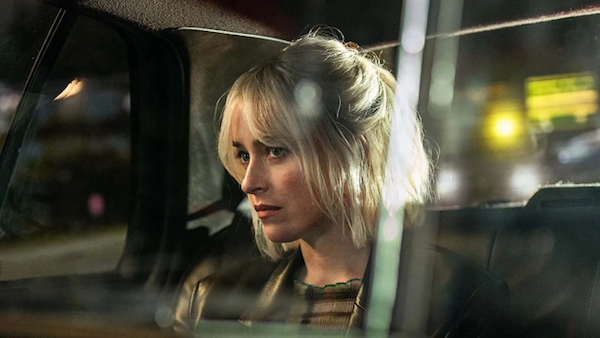Movie review by Greg Carlson
Originally conceived by writer-director Christy Hall as a stage play, the movie “Daddio” premiered in September of 2023 at the Telluride Film Festival. Featuring Dakota Johnson and Sean Penn as the only two significant characters with spoken dialogue in a credited cast of four (a curbside valet connects rider to car and we briefly glimpse a little girl in an adjacent vehicle), the story traces a late-night, near real-time journey from JFK to a destination in midtown Manhattan. Client and chauffeur have never met before – but an intimate connection will be forged. Playwright Hall, making her feature directorial debut, gets the most mileage (pun intended) from the two magnetic stars, who are called upon to use pauses, looks, and silences to add layers of meaning beyond the words they say to one another.
Many memorable films have relied on the cab as a setting to convey intense drama. Terry Malloy’s reckoning with his brother Charley the Gent in “On the Waterfront” is more than just a contender for top honors, but Travis Bickle’s odyssey as God’s Lonely Man in “Taxi Driver” might split the arrow in the “Waterfront” bullseye. Later, Abbas Kiarostami and Jafar Panahi dazzled critics with separate, Tehran-based docufictions that would lead, in the case of the former, to charges of abuse and intellectual property theft brought against the director by performers/artists Mania Akbari and Amina Maher.
“Daddio” never approaches the next-level transcendence of these examples, but Hall’s ambitious attempt to electrify the intimate communication of people confined to the seats of driver and passenger is, for the most part, less claustrophobic and static than the single location would at first suggest. Hall conducted principal photography in only 16 days on a soundstage using the on-set virtual production model called the “Volume,” the technology that integrates high-definition LED panels to display fully immersive backgrounds. Used extensively in “The Mandalorian,” the system’s application in the production of “Daddio” is, according to “Collider,” its first execution in a “grounded drama.”
While Hall has insisted that the amateur shrink portrayed by Penn represents an authentic type of NYC driver for hire, the audience is required to suspend disbelief that a much younger woman passenger would allow a total stranger to engage in all kinds of deeply intimate and sexually charged talk requiring highly personal revelations and borderline invasive disclosures. In this sense, “Daddio” cannot entirely escape comparison to aspects of the HBO series “Taxicab Confessions,” particularly in regard to back-and-forth texting/sexting between Johnson’s “Girlie” and the older married man with whom she is romantically involved.
Hall carves out enough space for the viewer to recognize the triple reflection suggested by the title; Johnson’s character projects an acute awareness of the unhealthy relationship markers commonly affiliated with the pop psychology of so-called “daddy issues.” Our cabbie instantly sniffs out the marital status of Girlie’s mature lover. Penn’s often vulgar and chauvinistic pronouncements might inspire less self-possessed travelers to change drivers (or maybe even file sexual harassment complaints). By the end of this particular journey, however, Johnson has opened up to her confessor with a vulnerability that suggests a desire for the kind of father-daughter relationship she never thought possible.
